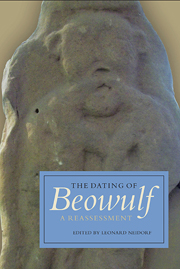Book contents
- Frontmatter
- Contents
- List of Tables
- List of Illustrations
- List of Contributors
- Acknowledgements
- Introduction
- 1 Beowulf and Language History
- 2 Germanic Legend, Scribal Errors, and Cultural Change
- 3 Names in Beowulf and Anglo-Saxon England
- 4 The Limits of Conservative Composition in Old English Poetry
- 5 The Date of Composition of Beowulf and the Evidence of Metrical Evolution
- 6 Beowulf and the Containment of Scyld in the West Saxon Royal Genealogy
- 7 History and Fiction in the Frisian Raid
- 8 ‘Give the People What They Want’: Historiography and Rhetorical History of the Dating of Beowulf Controversy
- 9 A Note on the Other Heorot
- 10 Beowulf and Conversion History
- 11 Material Monsters and Semantic Shifts
- 12 Scandals in Toronto: Kaluza's Law and Transliteration Errors
- 13 Afterword: Beowulf and Everything Else
- Index
10 - Beowulf and Conversion History
Published online by Cambridge University Press: 05 October 2014
- Frontmatter
- Contents
- List of Tables
- List of Illustrations
- List of Contributors
- Acknowledgements
- Introduction
- 1 Beowulf and Language History
- 2 Germanic Legend, Scribal Errors, and Cultural Change
- 3 Names in Beowulf and Anglo-Saxon England
- 4 The Limits of Conservative Composition in Old English Poetry
- 5 The Date of Composition of Beowulf and the Evidence of Metrical Evolution
- 6 Beowulf and the Containment of Scyld in the West Saxon Royal Genealogy
- 7 History and Fiction in the Frisian Raid
- 8 ‘Give the People What They Want’: Historiography and Rhetorical History of the Dating of Beowulf Controversy
- 9 A Note on the Other Heorot
- 10 Beowulf and Conversion History
- 11 Material Monsters and Semantic Shifts
- 12 Scandals in Toronto: Kaluza's Law and Transliteration Errors
- 13 Afterword: Beowulf and Everything Else
- Index
Summary
One of the more dramatic stories about the conversion of the Germanic peoples in the early middle ages concerns the pagan Frisian king (or duke) Radbod:
Praefatus autem princeps Rathbodus, cum ad percipiendum baptisma inbueretur, percunctabatur a sancto episcopo Vulframno, iuramentis eum per nomen Domini astringens, ubi maior esset numerus regum et principum seu nobilium gentis Fresionum, in illa videlicet caelesti regione, quam, si crederet et baptizaretur, percepturum se promittebat, an in ea, quam dicebat tartaream dampnationem.
Tunc beatus Vulframnus: “Noli errare, inclite princeps, apud Deum certus est suorum numerus electorum. Nam praedecessores tui principes gentis Fresionum, qui sine baptismi sacramento recesserunt, certum est dampnationis suscepisse sententiam; qui vero abhinc crediderit et baptizatus fuerit, cum Christo gaudebit in aeternum”.
Haec audiens dux incredulus – nam ad fontem processerat, – et, ut fertur, pedem a fonte retraxit, dicens, non se carere posse consortio praedecessorum suorum principum Fresionum et cum parvo pauperum numero residere in illo caelesti regno; quin potius non facile posse novis dictis adsensum praere, sed potius permansurum se in his, quae multo tempore cum omni Fresionum gente servaverat.
(The aforesaid lord (princeps?) Rathbodus, when he began to learn about baptism, inquired of the holy bishop Wulfram, binding [him] by oaths in the name of God, [as to] where the number of kings, lords and nobles of the race of the Frisians was greater – in that region of heaven which if he should believe and should be baptized, [the bishop] promised [him] he would see – or in that [region] which one called hellish damnation.
- Type
- Chapter
- Information
- The Dating of BeowulfA Reassessment, pp. 191 - 201Publisher: Boydell & BrewerPrint publication year: 2014



